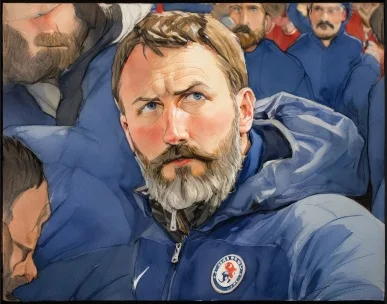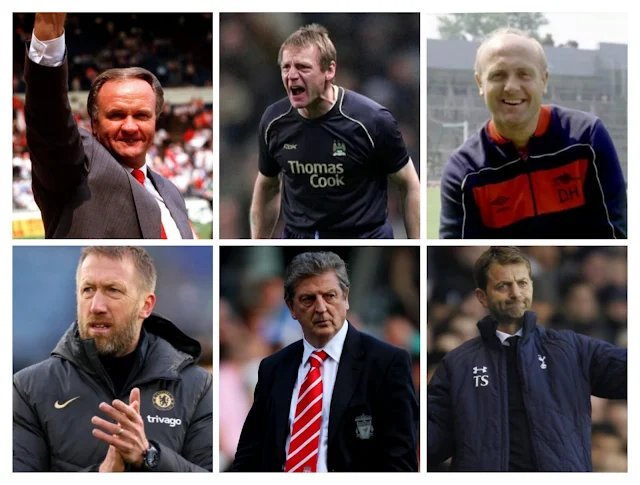The last English managers in the Premier League's Big Six mainly did not seem to have impressive spells.
English managers in the Premier League are still not as many as expected. The numbers do not seem to improve. In the 2023/24, only five Englishmen were in charge of the team at the beginning of the season. Now only four remain. It is quite decreasing compared to the last five years. There were at least seven English managers from 2020 to 2023.
Their number in EPL’s big six is even incredibly low. None has been appointed to be at the helm of any big clubs since Graham Potter in Chelsea two years ago. The only English boss in the top ten teams this season is Eddie Howe. The former Bournemouth boss is still in command of Newcastle United, which is not even one of the Premier League's Big Six.
Next season, Manchester United could be the first elite team to be led by English managers, should Gareth Southgate accept their offer. The current Three Lions boss has been linked to the Old Trafford post as Erik Ten Hag’s position has been reportedly in danger.
Unsurprisingly, the big six tend to pick foreign managers to take charge of the team instead of the local names due to at least two reasons, the limited figures with outstanding experience in the top sides and their relatively disappointing results. Here are the last English managers’ tenure in the big six.
Don Howe (Arsenal)
The last English manager in charge of The Gunners was before the EPL era. Don Howe was named Arsenal manager from 1983 to 1986. Yet, his spell was not that impressive. They only finished tenth, sixth, and seventh position twice in a row. Howe was then succeeded by George Graham who then guided The Gunners into their trophy laden era with six titles, including two league titles, one FA Cup and UEFA Winners Cup 1994. Meanwhile, Don Howe moved to QPR after helping Wimbledon clinch the FA Cup 1988 as an assistant manager. His last club in his managerial career was Coventry.
Roy Hodgson (Liverpool)
The former Crystal Palace, Inter Milan and Fulham boss might have been one of the best English managers who won titles abroad. Yet, his spell in Liverpool was not the one to remember. He was named to lead Steven Gerrard and Co in the 2010/11 season after bringing Fulham to the UEFA Cup final in 2010. Hogdson did not even last for a year at Anfield with only 13 victories and 9 draws in 31 games.
The former Switzerland and Finland manager eventually joined WBA before taking charge of the England national team after Fabio Capello’s resignation. The Three Lions did not have a remarkable result during his tenure in EURO 2012 and 2016 plus 2014 FIFA WorldCup. Joe Hart and Co could not progress further than the round of 16.
Stuart Pearce (Manchester City)
The former England international in the 1990s was the last English boss in the Citizens. He was at the helm of the club for two seasons, 2005/06 and 2006/07. At that time, they were not one of the elites which regularly fought for the European place. Yet, Manchester City was already in their rebuilding phase as they had attempted to sign several top players. Unfortunately, the team did not thrive under Pearce. Richard Dunne and Co only finished 15th and 14th on the table.
After leaving Etihad, he had no further success on the international stage with England U21, the Great Britain Olympic team in 2012, or at the club level with Nottingham Forest and West Ham. The Hammers was his last club in his managerial career as David Moyes’ assistant before he stepped down in 2022.
Ron Atkinson (Manchester United)
Manchester United's last English manager was Ron Atkinson. He was the head coach within the 1981-1986 period. At that time, The Red Devils were merely the dark horse in EPL at that time. Under Atkinson, they only finished third or fourth on the table, despite the fact that they managed to lift FA Cup trophies twice in 1983 and 1985. He was eventually replaced by Alex Ferguson, who transformed United into a rising giant during his long reign. Atkinson later joined Sheffield Wednesday and Aston Villa. He led them to the EFL League Cup titles in 1991 and 1994, respectively.
Tim Sherwood (Tottenham)
The former Blackburn skipper when they won the Premier League in 1995 was Spurs’ the permanent last English boss so far. He was named the manager for the 2013/14 campaign. It was the only full season in his managerial career. He was dismissed by the management after only guiding them finish sixth in the standings. Sherwood then took over Aston Villa in 2015 when he led them to the FA Cup final before suffering a heavy loss 4-0 from Arsenal. That was his last job in the dugout.
Graham Potter (Chelsea)
He is the most recent
English manager in the elite side. Potter had an impressive CV in Brighton
where he built the team to a solid dark horse and finished ninth in the
2021/22, their best position in the Premier League before his record was broken
by his successor, Roberto de Zerbi in 2023. The former Swansea and Ostersund
boss was hired by Chelsea to replace Thomas Tuchel. Unfortunately, his time at Stamford
Bridge was cut short despite signing a five-year contract. Potter did not even
make it to the end of the season, as he left after failing to get the Blues
into the Champions League zone. They dropped to 11th place before his departure. Overall, his team only managed to secure 12 games and 8 draws in
31 games.



Comments
Post a Comment